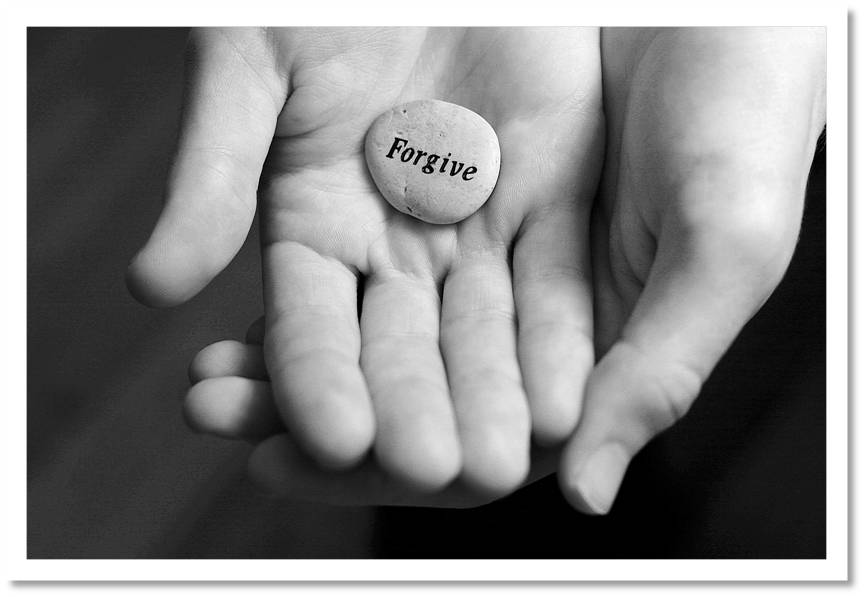
One of the first memories that I have about receiving forgiveness for doing something irreversible and certain of unfavorable consequences was when I was about 11 years old. My mother went on a trip to Mexico and while there she purchased a beautiful vase, which she proudly showcased in our living room. One day my brother and I were playing in the living room and I bumped into the table that the vase sat upon and it fell to the floor and shattered. All I could think about was how I destroyed something irreplaceable that made my mother so happy. I ran upstairs and cried in anguish over the disappointment that I caused and the punishment that I was sure to receive. When my mother came home from work and heard about what happened, she saw how upset and sorry I was. She told me that all was forgiven and assured me that the vase could be put back together. I felt so much love in her response telling me that I was absolved of the offense I had committed. God’s forgiveness and mercy are very much the same way. When we sin, he is waiting with open arms to forgive and restore us.
Forgiving Each Other
 “For if you forgive other people when they sin against you, your heavenly Father will also forgive you. But if you do not forgive others their sins, your Father will not forgive your sins” (Matthew 6:14-15). God’s forgiveness demands that we forgive others. As believers in Jesus Christ, we should always feel uneasy when there are unresolved issues between us and another person. In Matthew 18:21-22, Peter asked Jesus if forgiving someone seven times who sinned against him was sufficient. Jesus replied, not seven times, but seventy-seven times. Jesus taught that we should always forgive one another because our God has so freely forgiven us (Matthew 18:23-35).
“For if you forgive other people when they sin against you, your heavenly Father will also forgive you. But if you do not forgive others their sins, your Father will not forgive your sins” (Matthew 6:14-15). God’s forgiveness demands that we forgive others. As believers in Jesus Christ, we should always feel uneasy when there are unresolved issues between us and another person. In Matthew 18:21-22, Peter asked Jesus if forgiving someone seven times who sinned against him was sufficient. Jesus replied, not seven times, but seventy-seven times. Jesus taught that we should always forgive one another because our God has so freely forgiven us (Matthew 18:23-35).
God’s heartbeat is reconciliation. First, we must be reconciled to God through Jesus Christ. Then we must be reconciled with one another as children of God. Sometimes, we are hurt very deeply by another person’s actions toward us. Feeling hurt is understandable but should only be temporary. Sometimes, depending on the hurt that we have sustained, it may take a long time to forgive and move on. But there is a point in which we must make a choice between holding on to hurt feelings and being forgiving. Having an unforgiving spirit can result in complete loss of joy and experiencing all that God has planned for you. Long term, holding on to feelings of hurt can turn into resentment. Unresolved resentment can turn into bitterness. All this can eventually result in feelings of depression. We can even idolize our hurt and pain. It becomes woven into our very being. By holding on to pain, we may feel like we are justified in not having the responsibility to forgive. Even as Jesus was suffering on the cross for the sins of those who were mocking him, he showed mercy and extended grace and said, “Father, forgive them, for they do not know what they are doing” (Luke 23:34). Surely, this is an example that we can follow. If we don’t have the strength to do it, we can go to God in prayer. He will heal those who are brokenhearted (Psalms 147:3) and give them the strength and compassion to forgive. Prayer will change your entire perspective about the pain that you are feeling and about the person who has committed an offense against you.
We must also ask for forgiveness not only from God, but from those whom we have offended. In Matthew 5:23-26 Jesus says, we should leave our offering at the altar, go and reconcile with our brother or sister, who has something against us, and then come back and present our offering. Right after I became a Christian, I remember shopping at the mall and running into an old co-worker that I hadn’t seen in a long time. Our previous working relationship ended very badly with us exchanging words in anger. My former co-worker received the brunt of the altercation and got very upset. Before there was any chance of reconciliation, she was transferred to another location. After all those years, I could see that there was still pain in her eyes as the memory of that heated conversation played back in her mind. She was gracious enough to say hello to me. As we talked, I told her that I had recently given my life to Jesus Christ and that I was so very sorry for the way that I talked to her on that day that we argued. I asked for her forgiveness, which she gave. At that moment, God released both of us from that painful event and the healing began.
There will be times when forgiveness is not reciprocated or accepted. For example, a person may sincerely ask another person for forgiveness, but is met with refusal of their heartfelt request. On the other hand, a person who has committed an offense may never apologize for the acts committed against another person, but yet, we are still required to forgive them. In either case, we must be obedient to God and glorify him with our actions. In Matthew 5:44-48, Jesus gives great instruction for dealing with this. “But I tell you, love your enemies and pray for those who persecute you, that you may be children of your Father in heaven. He causes his sun to rise on the evil and the good, and sends rain on the righteous and the unrighteous. If you love those who love you, what reward will you get? Are not even the tax collectors doing that? And if you greet only your own people, what are you doing more than others? Do not even pagans do that? Be perfect, therefore, as your heavenly Father is perfect.”
Here are some other scriptures about forgiving each other:
- Matthew 6:12 – And forgive us our debts, as we have also forgiven our debtors.
- Mark 11:25 – And when you stand praying, if you hold anything against anyone, forgive him, so that your Father in heaven may forgive you your sins.
- Luke 6:35-36 – But love your enemies, do good to them, and lend to them without expecting to get anything back. Then your reward will be great, and you will be children of the Most High, because he is kind to the ungrateful and wicked. Be merciful, just as your Father is merciful.
- Romans 12:14-21 – Bless those who persecute you; bless and do not curse. Rejoice with those who rejoice; mourn with those who mourn. Live in harmony with one another. Do not be proud, but be willing to associate with people of low position. Do not be conceited. Do not repay anyone evil for evil. Be careful to do what is right in the eyes of everyone. If it is possible, as far as it depends on you, live at peace with everyone. Do not take revenge, my dear friends, but leave room for God’s wrath, for it is written: “It is mine to avenge; I will repay,” says the Lord. On the contrary: “If your enemy is hungry, feed him; if he is thirsty, give him something to drink. In doing this, you will heap burning coals on his head.” Do not be overcome by evil, but overcome evil with good.
- Ephesians 4:26-27 – “In your anger do not sin”: Do not let the sun go down while you are still angry, and do not give the devil a foothold.
- Ephesians 4:32 – Be kind and compassionate to one another, forgiving each other, just as in Christ God forgave you.
- Colossians 3:13 – Bear with each other and forgive whatever grievances you may have against one another. Forgive as the Lord forgave you.
Forgiveness and Consequences
 In Luke 23:39-43, a thief suffering the same sentence of crucifixion on the cross as Jesus, asked Jesus to remember him when he came into his kingdom. He was in essence repenting and asking for forgiveness. Jesus answered him, “Truly I tell you, today you will be with me in paradise.” The thief was forgiven of his sins, but still suffered the pain and agony of crucifixion and died. His circumstances were unchanged yet he received eternal life and is with Jesus in Heaven.
In Luke 23:39-43, a thief suffering the same sentence of crucifixion on the cross as Jesus, asked Jesus to remember him when he came into his kingdom. He was in essence repenting and asking for forgiveness. Jesus answered him, “Truly I tell you, today you will be with me in paradise.” The thief was forgiven of his sins, but still suffered the pain and agony of crucifixion and died. His circumstances were unchanged yet he received eternal life and is with Jesus in Heaven.
Likewise, there are times when we receive God’s mercy and forgiveness, but because the consequences of sin are still present we may ask, “If God forgave me why is there still so much pain, suffering and hardships? After all, 1 John 1:9 says, “If we confess our sins, he is faithful and just and will forgive us our sins and purify us from all unrighteousness.” According to this scripture, God will forgive and he absolutely does. However, it is God’s choice to remove the consequences of sin or to use them for some other purpose in our lives. Someone commits a felony and asks God for forgiveness, which he grants graciously, but there is still a lengthy prison sentence. Another person has an extramarital affair and asks God for forgiveness, which he also grants graciously, but the marriage may suffer separation or even divorce. Sinful decisions have consequences. Galatians 6:7 says, “… a man reaps what he sows”.
Unchanged circumstances do not mean that God does not love us or that he did not forgive us. Perhaps, they remain so that we will not commit sinful acts over and over again. Ask, and God will give you the grace to endure if you keep your heart and mind fixed on him.
Forgiving Ourselves and Carrying False Guilt
 Sometimes we dispense forgiveness to everyone, but ourselves. When we are tempted and fall into sin, Satan uses the guilt and shame to thwart God’s true purpose for our lives. Although God’s forgiveness is sought and received, the disappointment of a bad decision can lead to feelings of self loathing. When a person can’t forgive themselves it is as if they presume that their standard of forgiveness is higher than God’s. We must forget the past and look forward to what lies ahead (Philippians 3:13NLT).
Sometimes we dispense forgiveness to everyone, but ourselves. When we are tempted and fall into sin, Satan uses the guilt and shame to thwart God’s true purpose for our lives. Although God’s forgiveness is sought and received, the disappointment of a bad decision can lead to feelings of self loathing. When a person can’t forgive themselves it is as if they presume that their standard of forgiveness is higher than God’s. We must forget the past and look forward to what lies ahead (Philippians 3:13NLT).
Someone may have experienced unfortunate events from their past that were completely beyond their control, yet they blame themselves and carry around false guilt as a reminder of their past. For example, a person may have experienced abuse and blame themselves for causing an aggressor to get angry. Perhaps, someone is driving during inclement weather and accidentally crashes into another vehicle causing injury or even the death of another person and still blames themselves years later. In addition, someone may also experience guilt from a legalistic church background where they were told what not to wear, who not to associate with or to read the Bible and pray more than humanly possible. All of these things lead to false guilt, which keep a person in bondage and from fully living in freedom in their relationship with God. God never intended for us to carry these burdens. In John 10:10 Jesus says, “The thief comes only to steal and kill and destroy; I have come that they may have life, and have it to the full.”
Christians are in a battle each and every day as stated in Ephesians 6:12 and 1 Peter 5:8. The enemy, Satan will try to tempt us in so many ways. There are so many things that lie in our pathway that stimulate our flesh and tempt us into sin. If there is something that happened in the past and the enemy keeps bringing it up, here’s what God says in Psalm 103:12 says about those who have placed their complete faith and trust in Christ, “as far as the east is from the west, so far has he removed our transgressions from us.” We have freedom in Christ Jesus from our past. We are a new creation!
Sharing God’s Forgiveness
Those who are in Christ were once enemies of the cross. Having received God’s grace and forgiveness makes us Christ’s witnesses to share the message of redemption. Salvation through Jesus Christ is truly the greatest message that a Christian has to share. The message of the Gospel contains themes of love, redemption, deliverance and grace that is undeserved, but yet given as a free gift from God through the sacrifice made by his Son, Jesus Christ. See “Explaining God’s Grace” for tips on sharing the Gospel.
Receiving God’s Forgiveness
If you’re someone reading this that has never trusted in Jesus Christ as your personal Savior, I have some great news for you. God loves you so very much and has tremendous plans for your life. He not only wants to save you from your sins so that you can experience eternal life and be with him in heaven, but he also wants to be there for you through life’s difficulties. But to receive God’s forgiveness you must first acknowledge that you agree with God that you are separated from him by sin (Romans 3:23). You must also acknowledge that only Jesus Christ’s death on the cross can save you (Ephesians 2:8-9). You must accept Jesus Christ as your resurrected Lord and Savior (Romans 10:8-10) and turn away from your sins (Acts 3:19). If you’ve never trusted Christ before, I want to offer you the opportunity to hear the Gospel for yourself. Simply click here.
It’s so easy and so hard to do at the same time. “Thy will be done”.
Amen! I love the illustration between you and your mother. That’s just how our Heavenly Father forgives! Forgiving releases the bondage and makes us free, no longer crippled under bitterness.
Sandy, some time ago I shared a very personal matter with you. The person who committed that offense against me recentely died. I never told them that I forgave them and I want to release the hold they still have on me. What do I do now?
Hi Katrina,
Yes, I remember you sharing this. Leave it to you to ask the hard questions! LOL! Just kidding. In all seriousness, although this person can no longer see or hear you, you can still offer them forgiveness because, God can still see and hear your heart. If you are still holding on to the hurt and pain of the past, pray and ask God to help you to let go of the pain that you experienced in your past. Ask him for the strength to help you forgive this person (even though they have died) and move into restoration and experience his joy and will for your life. In Matthew 11:28-30 Jesus says, “Come to me, all you who are weary and burdened, and I will give you rest. Take my yoke upon you and learn from me, for I am gentle and humble in heart, and you will find rest for your souls. For my yoke is easy and my burden is light.” Will be praying for you Katrina… Love you! 🙂
Enjoyed this reading on forgiveness and especially the analogy with your mom accepting your sorrow of the accident, and quickly forgiving you. Giving forgiveness is truly a freedom to enjoy and likewise it releases that person or person’s. Especially when we pray for them. The adversary would want us to retaliate. Our God and his word is able to turn any situation around for our good and his Glory.
Your blog is awesome. Thank you for allowing the Lord to pour of Himself into you. You are truly an Ambassador of all He is.
7 x 70 🙂
You can forgive a person but you don’t have to best friend with the person again as long as you forgave them or ask forgivness thats all God want that we aleast forgave or ask for it…
Sometimes that can be the hardest thing… to let go of the hurt that was inflicted so effortlessly… It takes the bigger person to let go and forgive.
You are both correct. It takes letting go of our own pride to forgive and move on….but it is truly a burden lifted when you do. It takes to much energy to keep rehashing why you are upset and super stressful.